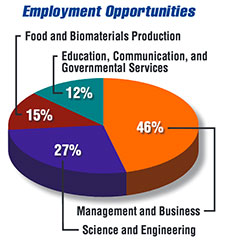 "Not only will those who study agriculture be likely to get well-paying jobs upon graduation, they will also have the satisfaction of working in a field that addresses some of the world's most pressing challenges," stated USDA Secretary Vilsack.
"Not only will those who study agriculture be likely to get well-paying jobs upon graduation, they will also have the satisfaction of working in a field that addresses some of the world's most pressing challenges," stated USDA Secretary Vilsack.The United States Department of Agriculture and Purdue University released a report on job availability for new college graduates, "Employment Opportunities for College Graduates in Food, Agriculture, Renewable Natural Resources, and the Environment, United States, 2015–2020". The shortfall in people to fill those jobs should make students look twice at agriculture. There are nearly twice as many openings as graduates to fill them.
The report focused on bachelor's degrees and higher in fields of science, technology, engineering, mathematics, education, communication and government services. A farming background isn't an automatic ticket to an ag job, but combined with a college education, it will provide additional knowledge and skills needed to thrive in the workplace. The summary of the report with the careers can be found here.
Many of these jobs will provide services to those in production agriculture. However, with the number of farms declining, will fewer professionals be needed to serve fewer farmers? Perhaps, but having the solid education in science, technology and so forth still makes for an outstanding applicant – in or out of agriculture.
The intended take away for college students? Get an ag degree and instantly the perfect job appears? Hardly. Employers still want to see proof of solid academic learning, effective personal communication skills, and critical thinking which develops logical decision-making skills.
For college ag students today, it starts with a solid education. Add industry connections by becoming active in organizations that network with professionals, which often lead to internships where they can learn about a position before deciding if it's the career choice for you.
There are ag jobs all over the country. You cannot expect every job that peaks your interest to be based in the city (or state) you want to live in.
The jobs will definitely be there. Will our ag graduates be prepared? Yes. If jobs aren't taken by ag majors, employers turn to non-ag students with biology, business administration, engineering, education, communication and consumer science degrees to fill the gap.

The author is the online media manager and is responsible for the website, webinars and social media. A graduate of Modesto Junior College and Fresno State, she was raised on a California dairy and frequently blogs on youth programs and consumer issues.








